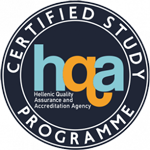Theory / Lab / Tutoring / Exercises Sessions
3 / - / - / -
Prerequisites
DELOG01-2 Financial Accounting I
Instruction & Examination Language
Greek
Available for Erasmus Students
-
Course Type
Scientific Expertise
Course Objectives - Contents
- What are mutual funds and how do they operate?
- Institutional and supervisory framework
- Hellenic Fund and Asset Management Association, FEFSI and ICI
- The Greek mutual fund market
- Investment techniques for managers
- Mutual funds – risk assessment
- Principles of portfolio construction and management
- Theoretical approach to the evaluation of portfolio (or mutual fund) performance
- Timing and selectivity
- Mutual fund evaluation companies: the innovative approach adopted by Morningstar
- Index funds
- The impact of the personal characteristics of managers on performance (hot hand phenomenon)
- Causal relationship between stock market indices and cash inflows in the area of mutual funds: international experience and data regarding the situation in Greece
- Factors affecting demand for mutual funds
- Marketing of mutual funds
- Property mutual funds
- New trends in the mutual fund market: hedge funds, exchange-traded funds, funds of funds
- Portfolio investment companies
- Advantages and disadvantages of mutual funds
- Types of investment company
- Mutual funds and internet
Learning Results
The liberalization of money and capital markets and subsequent globalization have brought about rapid developments in the services offered and have contributed to the growth in number and complexity of available financial products.
On successful completion of the course students will have knowledge of:
- the new conditions in global money and capital markets, as well as national and international developments in the most important forms of collective investment such as mutual funds;
- the institutional framework within which markets operate, the historical development of the institution, the companies, management, products, asset valuation methods, risk assessment, criteria of selection and evaluation of individual collective investments and marketing of specific investment products;
- risk assessment and methods for evaluating manager performance; and
- new trends in the area of collective investments, for example, hedge funds, exchange-traded funds, and funds of funds.




